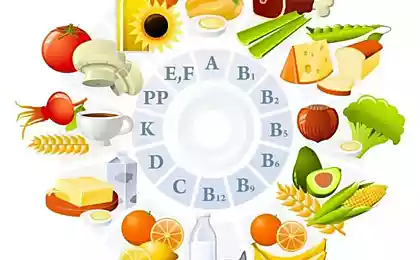37
5 Hidden Signs That Your Diet Is Destroying Your Body

Do you honestly think you are eating right? Vegetables for dinner, giving up fast food, protein shakes after training... But what if I told you that your body is screaming for help and you just can't decipher its signals?
Nutrition is not just fuel for the body, it is a complex biochemical symphony, where each nutrient plays its part. When one instrument fakes, the whole melody of life begins to sound dissonant.
The modern world is deceptive: we live in an era of abundance of food, but paradoxically suffer from hidden hunger - micronutrient deficiency. According to the World Health Organization, more than 2 billion people in the world are deficient in essential vitamins and minerals, even eating enough calories.
1Chronic fatigue – when the body is working hard
Imagine a car fueled with water instead of gasoline. The engine works, but with interruptions, parts wear out faster and power drops. This is how your body feels with an unbalanced diet.
An alarm bell: If after an 8-hour sleep you wake up broken, and by lunch you feel like you have passed a marathon – your diet requires an urgent review.
The main culprits of the energy crisis are a shortage of high-quality protein and iron. Protein is not just a building material for muscles, it is the basis of all enzymatic processes in the body. When it is not enough, the body begins to “eat” its own muscles, which leads to a slowdown in metabolism.
Iron is the oxygen courier of the body
Iron deficiency affects one in four women of reproductive age. This mineral is part of hemoglobin, a protein that transports oxygen to each cell. Without enough oxygen, cells literally suffocate, which is manifested by chronic fatigue, dizziness and pale skin.
Energy rescue plan:
- Include in every meal high-quality: fish, meat, eggs, cottage cheese, legumes
- Eat foods rich in iron: beef liver, spinach, dark chocolate, lentils
- Combine vegetable iron with vitamin C for better absorption
- Control your total calorie intake – your body needs enough energy to live
2 Digestive chaos - when the intestines go on strike
2197-1959
Your gut is not just a digestive tube, it’s an entire ecosystem of trillions of microorganisms. Modern diets, overloaded with processed foods, turn this thriving ecosystem into a desert.
Fiber is food for your “inner pets.” When you feed them properly, they pay you back with strong immunity, good mood and perfect digestion.
Studies show that modern people consume an average of 15-20 grams of fiber per day, at a rate of 25-38 grams. This deficiency leads to the development of “leaky bowel syndrome”, inflammatory processes and disruption of the synthesis of the most important B vitamins.
Microbiome Recovery Program:
- Each meal should include at least 2-3 types of vegetables colourful
- Replace white rice and bread with whole-grain counterparts
- Include in the diet fermented foods: kefir, kimchi, sauerkraut
- Gradually increase your fiber intake – a sharp jump can cause discomfort
3 Emotional roller coaster - when sugar drives mood
Familiar picture: in the morning you are full of energy, at lunch irritable, in the evening dream only of sweets? Congratulations, you have become a hostage to a sugar swing, one of the most insidious metabolic disorders.
When blood glucose levels jump sharply after eating simple carbohydrates, the pancreas ejects a shock dose of insulin. After an hour or two, glucose drops rapidly, the brain panics and requires a new dose of “fast energy.” This creates a vicious cycle of sugar addiction.
The average person consumes about 70 grams of added sugar per day – that’s almost 18 teaspoons! At the recommended rate, no more than 25 grams for women and 37 grams for men.
Hidden sugar hides in the most unexpected places: ketchup, bread, sausage, ready-made sauces, “healthy” muesli and even baby food.
Sugar detoxification strategy:
- The rule of "health plates": 1/2 - vegetables, 1/4 - protein, 1/4 - complex carbohydrates
- Sugar can be hidden under 50+ names
- Replace sweets with fruit with nuts or dark chocolate (70%+ cocoa)
- Drink more water – we often mistake thirst for hunger
4 Weight fluctuations – when the body does not know what it wants
Does your weight jump like a pendulum? Today plus a kilo, tomorrow minus two, the day after tomorrow again plus three? This is not a machination of the scales - it is a signal of a profound violation of the metabolic balance.
The paradox of modern nutrition is that we can overeat and undereat at the same time. Overeat calories due to “empty” foods and malnutrition in nutrients that are necessary for normal metabolism.
The body is not a calorie calculator, but a complex biochemical laboratory. Food quality determines not only weight, but also how effectively all body systems work.
5 Immune Disaster – When Defenses Give Up
If you pick up every virus that “passes by”, and the cold becomes your constant companion – it’s not a matter of weak immunity, but poor nutrition. 70% of immune cells are in the gut, and their condition depends on what you eat.
Vitamin-mineral army of protection:
Vitamin D Commander of the immune army. Its deficiency increases the risk of respiratory infections by 3 times.
zinc - Lymphocyte general. More than 300 enzymes are involved in the work.
Vitamin C A medical professional who repairs damaged cells.
selenium A sniper that destroys free radicals.
Plan for strengthening the immune strength:
- Use it every day. 5-7 servings multicolored
- Include in the diet fatty fish, nuts, seeds - sources of omega-3
- Take vitamin D tests regularly and take supplements if necessary.
- Limit sugar and alcohol – they suppress immune function
It's important to remember: If the symptoms are severe or long-lasting, be sure to see a doctor. Sometimes, for malnutrition hides serious diseases that require medical intervention.
Conclusion: Your Path to Food Harmony
A balanced diet is not a diet, but a lifestyle. It is the art of listening to your body and giving it exactly what it needs to function optimally. Remember, change must be gradual and sustainable.
Every meal is an opportunity to invest in your health. Choose wisely and your body will thank you with energy, good mood and good health for years to come.
Glossary of terms
Micronutrients
Vitamins and minerals required by the body in small amounts for the normal functioning of all systems.
hemoglobin
Iron-containing red blood cell protein, which carries oxygen from the lungs to the body tissues.
Fiber
Indigestible plant fibers that stimulate digestion and serve as food for beneficial intestinal microflora.
microbiome
The totality of all microorganisms living in the human intestine and involved in digestion, immune protection and synthesis of vitamins.
insulin
Pancreatic hormone, which regulates the level of glucose in the blood, promoting its absorption by cells.
Omega-3 fatty acids
Essential polyunsaturated fatty acids necessary for brain function, cardiovascular system and immunity.























